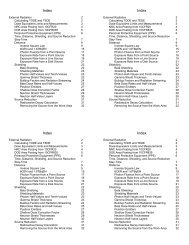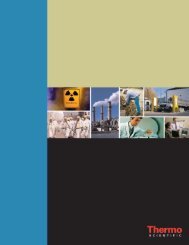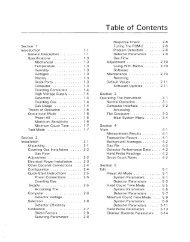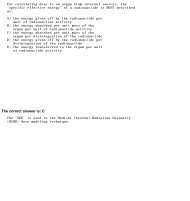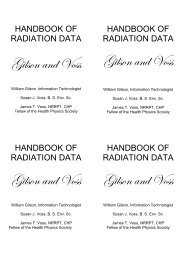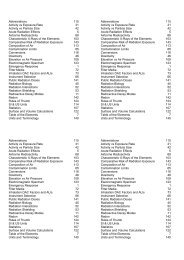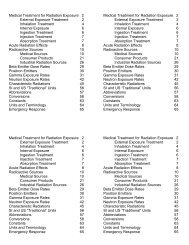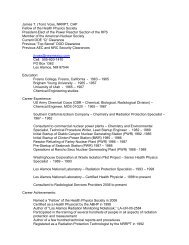Medical Physics Hand.. - Voss Associates
Medical Physics Hand.. - Voss Associates
Medical Physics Hand.. - Voss Associates
Create successful ePaper yourself
Turn your PDF publications into a flip-book with our unique Google optimized e-Paper software.
machine or with a more sophisticated x-ray machinecalled a CT or CAT scan machine.• In nuclear medicine procedures, a very small amountof radioactive material is inhaled, injected, or swallowedby the patient. If you have a nuclear medicine exam, aspecial camera will be used to detect energy given offby the radioactive material in your body and form apicture of your organs and their function on a computermonitor. A nuclear medicine physician views thesepictures. The radioactive material typically disappearsfrom your body within a few hours or days.Do magnetic resonance imaging (MRI) andultrasound use radiation?MRI and ultrasound procedures do not use ionizingradiation. If you have either of these types of studies,you are not exposed to radiation.Do benefits from medical examinations usingradiation outweigh the risks from the radiation?Your doctor will order an x-ray test for you when it isneeded for accurate diagnosis of your condition.Benefits from the medical procedure greatly outweighany potential small risk of harm from the amount ofradiation used. There is no conclusive evidence ofradiation causing harm at the levels patients receivefrom diagnostic x-ray exams. Although high doses ofradiation are linked to an increased risk of cancer, the14machine or with a more sophisticated x-ray machinecalled a CT or CAT scan machine.• In nuclear medicine procedures, a very small amountof radioactive material is inhaled, injected, or swallowedby the patient. If you have a nuclear medicine exam, aspecial camera will be used to detect energy given offby the radioactive material in your body and form apicture of your organs and their function on a computermonitor. A nuclear medicine physician views thesepictures. The radioactive material typically disappearsfrom your body within a few hours or days.Do magnetic resonance imaging (MRI) andultrasound use radiation?MRI and ultrasound procedures do not use ionizingradiation. If you have either of these types of studies,you are not exposed to radiation.Do benefits from medical examinations usingradiation outweigh the risks from the radiation?Your doctor will order an x-ray test for you when it isneeded for accurate diagnosis of your condition.Benefits from the medical procedure greatly outweighany potential small risk of harm from the amount ofradiation used. There is no conclusive evidence ofradiation causing harm at the levels patients receivefrom diagnostic x-ray exams. Although high doses ofradiation are linked to an increased risk of cancer, the14machine or with a more sophisticated x-ray machinecalled a CT or CAT scan machine.• In nuclear medicine procedures, a very small amountof radioactive material is inhaled, injected, or swallowedby the patient. If you have a nuclear medicine exam, aspecial camera will be used to detect energy given offby the radioactive material in your body and form apicture of your organs and their function on a computermonitor. A nuclear medicine physician views thesepictures. The radioactive material typically disappearsfrom your body within a few hours or days.Do magnetic resonance imaging (MRI) andultrasound use radiation?MRI and ultrasound procedures do not use ionizingradiation. If you have either of these types of studies,you are not exposed to radiation.Do benefits from medical examinations usingradiation outweigh the risks from the radiation?Your doctor will order an x-ray test for you when it isneeded for accurate diagnosis of your condition.Benefits from the medical procedure greatly outweighany potential small risk of harm from the amount ofradiation used. There is no conclusive evidence ofradiation causing harm at the levels patients receivefrom diagnostic x-ray exams. Although high doses ofradiation are linked to an increased risk of cancer, the14machine or with a more sophisticated x-ray machinecalled a CT or CAT scan machine.• In nuclear medicine procedures, a very small amountof radioactive material is inhaled, injected, or swallowedby the patient. If you have a nuclear medicine exam, aspecial camera will be used to detect energy given offby the radioactive material in your body and form apicture of your organs and their function on a computermonitor. A nuclear medicine physician views thesepictures. The radioactive material typically disappearsfrom your body within a few hours or days.Do magnetic resonance imaging (MRI) andultrasound use radiation?MRI and ultrasound procedures do not use ionizingradiation. If you have either of these types of studies,you are not exposed to radiation.Do benefits from medical examinations usingradiation outweigh the risks from the radiation?Your doctor will order an x-ray test for you when it isneeded for accurate diagnosis of your condition.Benefits from the medical procedure greatly outweighany potential small risk of harm from the amount ofradiation used. There is no conclusive evidence ofradiation causing harm at the levels patients receivefrom diagnostic x-ray exams. Although high doses ofradiation are linked to an increased risk of cancer, the14



